
The new-age conscious traveller is increasingly pursuing "indulgence" that's removed from materialism; the one that comes with negotiating the earth's uncharted, rugged nooks and tuning into raw wilderness, its miracles and extremities. Nestled in Australia's largely untrampled Northern Territory and 150 km from the vibrant capital city of Darwin, Kakadu National Park is your chance to revel in seclusion, serenity and a spiritual connection to an ancient land. It is so remote that it almost feels otherworldly!
Rewarded a dual UNESCO World Heritage listing for its outstanding natural and cultural values, the mammoth 20,000 sq km park bowls you over with its ecological and biological diversity. Witness swimming holes hidden deep within forests, picture-perfect gorges, breathtaking sandstone escarpments, savanna woodlands with towering termite mounds, hills and ridges resulting from millions of years of erosion and varied wetlands. And you needn't spend hours scouting for wildlife here. Kakadu's manifold ecosystems are teeming with extraordinary concentrations of rare and endemic plants and animals, including 290 bird species, 68 land mammals, never-seen-before insects and heaps of reptiles, frogs and fish species. Expect surprise encounters with free-wandering dingoes, antilopine kangaroos, black wallaroos and agile wallabies. Not to forget, there are croc warning signs around every corner.
What makes Kakadu's remarkable wildscape all the more meaningful? The fact that it is home to the world's oldest continuous culture, thanks to the Bininj/ Mungguy Aboriginal people who have inhabited this territory for more than 65,000 years, dating back to before the last ice age. Although their lifestyle may have evolved, their languages, core beliefs and customs, passed down generations have remained intact.
This story is from the 16th September, 2024 edition of India Today.
Start your 7-day Magzter GOLD free trial to access thousands of curated premium stories, and 9,000+ magazines and newspapers.
Already a subscriber ? Sign In
This story is from the 16th September, 2024 edition of India Today.
Start your 7-day Magzter GOLD free trial to access thousands of curated premium stories, and 9,000+ magazines and newspapers.
Already a subscriber? Sign In
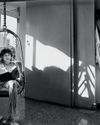
He gave the beat to the world
He would pick up the rhythms of each experience of mobility and weave them into his taals. Thus it was that he reflected joy and laughter in rhythmic cycles...such was the magic of Zakir's fingersText and photographs by Raghu Rai
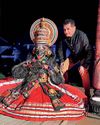
KERALA TOURISM CAMPAIGN, 1989 - TICKETS TO PARADISE
All it took was a catchy tagline-'God's Own Country'-for the world to discover Kerala's wealth of natural beauty. It remains among the best tourism ad campaigns, earning the state a place among top 10 international destinations

SPIRITUALITY - THE GURUS OF COOL
Among the cult Indian gurus, no one had a bigger hold on western minds than 'Osho' Rajneesh. He's also perhaps the role model for the enterprise-building gurus of today
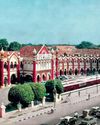
RETAIL SHOPPING - THE MALL MANIA
Shopping malls, a 1990s innovation in India, changed the way the Indian middle class shops. Their success now lies in being 'shoppertainment' destinations, offering something for everyone

CULINARY RENAISSANCE, 1978 - TANDOORI NIGHTS
ITC's Bukhara and Dum Pukht turned the world to tandoori cuisine and had an enormous impact on the F&B industry. Decades on, they are still a pit-stop for celebrities and heads of state visiting Delhi
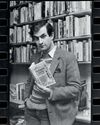
INDIAN WRITING IN ENGLISH - REVENGE OF THE NATIVE
Rushdie lit the way but Indian writing in English has taken a life of its own in the past few decades, with translated Indian fiction most recently having its moment in the sun
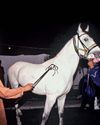
INDIAN ART - A BRUSH WITH GOLD DUST
The 1990s economic liberalisation came as oxygen, lighting up the Indian art scene. Today, artworks by established masters routinely go for astronomical amounts
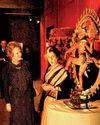
FESTIVAL OF INDIA, 1982 - CULTURE CAPITAL
The Festival of India grew into a symbol of our 'soft power', introducing our art and aesthetics to a global audience while also helping rebrand our domestic products

THE INDIPOP TREND - DISCO GOES DESI
For ages, the film song ruled. Nothing else was audible. Then came Nazia, charioteered by Biddu, and Indian ears went into a pleasant madness. Literally, Disco Deewane. A whole genre was born
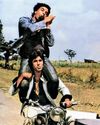
SHOLAY 1975 - THE BIRTH OF THE FANDEMIC
India had seen hits before. But Sholay seared into its collective psyche like a badland bullet. The effect was on a scale never seen before- one film creating a new mass folk culture. And a trail of monster blockbusters that still continues